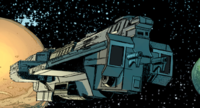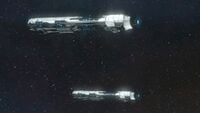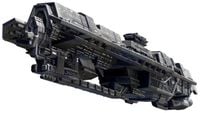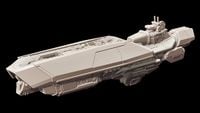UNSC carrier: Difference between revisions
From Halopedia, the Halo wiki
m (→Ship classes) |
(Added citations) Tag: Mobile edit |
||
| Line 6: | Line 6: | ||
|manufacturer= | |manufacturer= | ||
|class=[[Carrier]] | |class=[[Carrier]] | ||
|role= | |role=Transport and deployment of fighters and ground troops, Command and control {{Ref/Reuse|Enc22}} | ||
|length=Variable | |length=Variable | ||
*{{Convert|3000|m|ft|sp=us}}<ref name="enc">'''[[Halo Encyclopedia (2009 edition)]]''', page 249 (2009)</ref> {{c|Unspecified class}} | *{{Convert|3000|m|ft|sp=us}}<ref name="enc">'''[[Halo Encyclopedia (2009 edition)]]''', page 249 (2009)</ref> {{c|Unspecified class}} | ||
|width=Variable | |width=Variable | ||
*{{Convert|120|m|ftin|sp=us}}{{Ref/Reuse|enc}} {{c|Unspecified class}} | *{{Convert|120|m|ftin|sp=us}}{{Ref/Reuse|enc}} {{c|Unspecified class}} | ||
|height= | |height= Variable | ||
|engine= | |engine= | ||
|slipspace drive=[[Shaw-Fujikawa Translight Engine]] | |slipspace drive=[[Shaw-Fujikawa Translight Engine]] | ||
|hull= | |hull= [[Titanium-A armor]] | ||
|armament=Variable | |armament=Variable | ||
**[[Magnetic Accelerator Cannon]]{{Ref/Reuse|enc}} | **[[Magnetic Accelerator Cannon]]{{Ref/Reuse|enc}} | ||
** | **[[Archer missile]]s{{Ref/Reuse|enc}} | ||
** | **[[fusion rocket]]s{{Ref/Reuse|enc}} | ||
**[[Point defense gun]]s {{ | **[[Point defense gun]]s {{Ref/Reuse|Enc22}} | ||
**Nuclear missiles | **Nuclear missiles | ||
|complement=*[[GA-TL1 Longsword]]s{{Ref/Reuse|enc}} | |complement=*[[GA-TL1 Longsword]]s{{Ref/Reuse|enc}} | ||
*[[D77-TC Pelican]]s{{Ref/Reuse|enc}} | *[[D77-TC Pelican]]s{{Ref/Reuse|enc}} | ||
| Line 33: | Line 32: | ||
*[[Human-Covenant War]] | *[[Human-Covenant War]] | ||
*[[Post-Covenant War conflicts]] | *[[Post-Covenant War conflicts]] | ||
|affiliation=[[UNSC Navy]] | |affiliation=[[UNSC Navy]] {{Ref/Reuse|Enc22}} }} | ||
}} | '''Carrier''' is a [[capital ship|capital]] [[warship]] [[UNSC starship|classification used]] by the [[UNSC Navy]]. {{Ref/Book|Id=Enc22|Enc22|Page=126}} | ||
'''Carrier''' is a [[capital ship|capital]] [[warship]] [[UNSC starship|classification used]] by the [[UNSC Navy]]. | |||
==Design== | ==Design== | ||
The Navy operates several carrier classes, including the ''[[Poseidon-class light carrier|Poseidon]]'', ''[[Orion-class assault carrier|Orion]]'', ''[[Epoch-class heavy carrier|Epoch]]'', and ''[[Punic-class supercarrier|Punic]]'' classes.{{Ref/Note|The ''Atlas'' as seen in ''Halo: Fall of Reach - Boot Camp'' and the ''Musashi'' as seen in ''Fall of Reach - Invasion'' do not appear to belong to any of the established carrier classes. The former shares design features with the {{Class|Phoenix|colony ship}} and the ''Epoch''-class carrier while the latter vaguely resembles the {{Class|Halberd|light destroyer}}. The ''Atlas'' was later depicted in ''[[Halo: The Fall of Reach]]'' with a completely different design reminiscent of the ''Punic''-class supercarrier; while the newer depiction is presumably the ship's canonical appearance, the prior incarnation may nonetheless represent a canonically distinct class.}} UNSC carriers range from light warships to among the largest ships in service. The smallest known class, the Poseidon-class light carrier, is only 719 meters from stem to stern, smaller than a cruiser.<ref>[http://halo.bungie.org/halobulletins/147 '''Halo Waypoint''': ''The Halo Bulletin 5.14.14'']</ref> The largest | The Navy operates several carrier classes, including the ''[[Poseidon-class light carrier|Poseidon]]'', ''[[Orion-class assault carrier|Orion]]'', ''[[Epoch-class heavy carrier|Epoch]]'', and ''[[Punic-class supercarrier|Punic]]'' classes.{{Ref/Note|The ''Atlas'' as seen in ''Halo: Fall of Reach - Boot Camp'' and the ''Musashi'' as seen in ''Fall of Reach - Invasion'' do not appear to belong to any of the established carrier classes. The former shares design features with the {{Class|Phoenix|colony ship}} and the ''Epoch''-class carrier while the latter vaguely resembles the {{Class|Halberd|light destroyer}}. The ''Atlas'' was later depicted in ''[[Halo: The Fall of Reach]]'' with a completely different design reminiscent of the ''Punic''-class supercarrier; while the newer depiction is presumably the ship's canonical appearance, the prior incarnation may nonetheless represent a canonically distinct class.}} UNSC carriers range from light warships to among the largest ships in service. The smallest known class, the Poseidon-class light carrier, is only 719 meters from stem to stern, smaller than a cruiser.<ref>[http://halo.bungie.org/halobulletins/147 '''Halo Waypoint''': ''The Halo Bulletin 5.14.14'']</ref> The largest carriers are multiple kilometers long and have a beam of over 100 meters.{{Ref/Reuse|enc}} Most carriers crew and complement exceed 2,000 can carry numerous space, air, and ground vehicles.{{Ref/Reuse|enc}} Befitting their role, their primary asset is a large number of [[GA-TL1 Longsword]] interceptors or [[F-41 Broadsword]] multirole fighters. | ||
==Armament== | ==Armament== | ||
Despite their size, UNSC carriers depend on their fighter wings for offense, though they are often equipped with at least one [[Magnetic Accelerator Cannon]]. Secondary armament is provided by 300 [[Archer missile]]s, while tertiary armament includes two [[fusion rocket]]s.{{Ref/Reuse|enc}} Carriers also mount numerous [[point defense gun]]s, such as the [[M910 point defense network]] used by the ''Epoch''-class, as well as several nuclear missiles of various types. | Despite their size, UNSC carriers depend on their fighter wings for offense, though they are often equipped with at least one [[Magnetic Accelerator Cannon]]. Secondary armament is provided by 300 [[Archer missile]]s, while tertiary armament includes two [[fusion rocket]]s.{{Ref/Reuse|enc}} Carriers also mount numerous [[point defense gun]]s, such as the [[M910 point defense network]] used by the ''Epoch''-class, as well as several nuclear missiles of various types. {{Ref/Reuse|Enc22}} | ||
==Classes== | ==Classes== | ||
{| class="wikitable" | {| class="wikitable" | ||
| Line 85: | Line 82: | ||
*''[[Halo: Legacy of Onyx]]'' | *''[[Halo: Legacy of Onyx]]'' | ||
*''[[Halo: Evolutions - Essential Tales of the Halo Universe]]'' | *''[[Halo: Evolutions - Essential Tales of the Halo Universe]]'' | ||
**''[[The Impossible Life and the Possible Death of Preston J. Cole]]'' | **''[[The Impossible Life and the Possible Death of Preston J. Cole]]'' <ref name="evo">'''[[Halo: Evolutions - Essential Tales of the Halo Universe]]''', "[[The Impossible Life and the Possible Death of Preston J. Cole]]", ''pages 476-487''</ref> | ||
*''[[Halo: Fall of Reach]]'' | *''[[Halo: Fall of Reach]]'' | ||
**''[[Halo: Fall of Reach - Boot Camp|Boot Camp]]'' | **''[[Halo: Fall of Reach - Boot Camp|Boot Camp]]'' | ||
Revision as of 22:30, October 26, 2022
| This article does not have enough inline citations and/or does not adhere to the proper citation format. You can help Halopedia by adding citations. |
| UNSC carrier | |
|---|---|
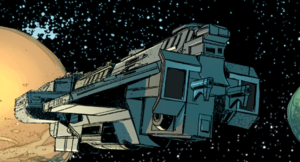
| |
| Production information | |
|
Class: |
|
|
Role: |
Transport and deployment of fighters and ground troops, Command and control [1] |
| Technical specifications | |
|
Length: |
Variable
|
|
Width: |
Variable
|
|
Height: |
Variable |
|
Slipspace drive: |
|
|
Hull: |
|
|
Armament: |
Variable |
|
Complement: |
|
|
Crew: |
Variable
|
| Chronological and affiliation | |
|
Era: |
|
|
Affiliation: |
|
Carrier is a capital warship classification used by the UNSC Navy. [1]
Design
The Navy operates several carrier classes, including the Poseidon, Orion, Epoch, and Punic classes.[Note 1] UNSC carriers range from light warships to among the largest ships in service. The smallest known class, the Poseidon-class light carrier, is only 719 meters from stem to stern, smaller than a cruiser.[3] The largest carriers are multiple kilometers long and have a beam of over 100 meters.[2] Most carriers crew and complement exceed 2,000 can carry numerous space, air, and ground vehicles.[2] Befitting their role, their primary asset is a large number of GA-TL1 Longsword interceptors or F-41 Broadsword multirole fighters.
Armament
Despite their size, UNSC carriers depend on their fighter wings for offense, though they are often equipped with at least one Magnetic Accelerator Cannon. Secondary armament is provided by 300 Archer missiles, while tertiary armament includes two fusion rockets.[2] Carriers also mount numerous point defense guns, such as the M910 point defense network used by the Epoch-class, as well as several nuclear missiles of various types. [1]
Classes
| Class | Image | Details |
|---|---|---|
| Infinity-class supercarrier |  |
|
| Punic-class supercarrier | 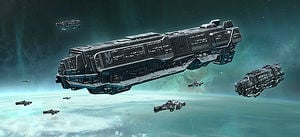 |
The supercarrier was used for direct confrontation with Covenant capital ships, and was one of the few UNSC ships effective in this role |
| Epoch-class heavy carrier | 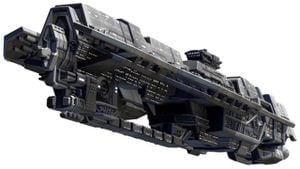 |
The heaviest variety of carrier in service behind only the immense supercarriers, the Epoch class' tonnage exceeds that of both the Poseidon and the Orion classes. Often forming the core of most UNSC fleets, the heavy carrier is capable of taking extreme damage in combat. |
| Orion-class assault carrier | 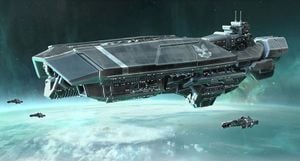 |
Considered state-of-the-art when it was introduced, the Orion-class assault carrier incorporated the miniaturized and reconfigurable automated factories and chemical processors that were commonly found in colony support vessels, allowing the carriers to produce fuel, spare parts, and rarely even complete combat vehicles without outside assistance |
| Phoenix-class support vessel |  |
The Phoenix-class colonial support vessel is a colony ship classification used by the Unified Earth Government.At least one Phoenix, the UNSC Spirit of Fire, was modified for wartime use by the United Nations Space Command and redesignated a Phoenix-class support vessel. |
| Poseidon-class light carrier | 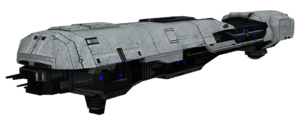 |
The Poseidon-class carrier is sleek, elongated, and somewhat cylindrical in general shape. Its structure comprises two main sections covered with white plating; in the fore section, the plating mostly covers the vessel's dorsal surfac |
Ships of the line
| Class | Fleet or last known tactical grouping | Ship Name | Hull classification symbol | Last known captain | Notes |
|---|---|---|---|---|---|
| Epoch-class heavy carrier | Unknown | UNSC Epoch | Lead ship | ||
| UNSC Atlas | |||||
| Infinity-class supercarrier | Expeditionary Strike Group 1 | UNSC Infinity | INF-101 | Thomas Lasky | Lead ship. Missing over Installation 07. |
| Unknown | UNSC Eternity | Not Completed | |||
| Orion-class assault carrier | Unknown | UNSC Fifth Winter | |||
| UNSC Orion | Lead ship | ||||
| Phoenix-class carrier | Third Fleet | UNSC Spirit of Fire | CFV-88 | James Cutter | Active but officially listed as lost with all hands. |
| Poseidon-class light carrier | Unknown | UNSC Milwaukee | |||
| UNSC Poseidon | Lead ship | ||||
| Punic-class supercarrier | Unknown | UNSC Punic | Lead ship | ||
| Epsilon Eridani Fleet | UNSC Trafalgar | Flagship of Epsilon Eridani Fleet. Destroyed over Reach | |||
| Unknown | UNSC Home Fleet | UNSC Stalingrad | Carl Patterson | ||
| UNSC Witness | |||||
| Third Fleet | UNSC Totem Lake | ||||
| Unknown | UNSC All Under Heaven | ||||
| UNSC Magellan | |||||
| UNSC Musashi |
Gallery
- UNSC Musashi.jpg
The destruction of the carrier Musashi.
The Atlas in Halo: Fall of Reach.
The Atlas in Halo: The Fall of Reach - The Animated Series.
A converted Phoenix-class colony ship.
Notes
- ^ The Atlas as seen in Halo: Fall of Reach - Boot Camp and the Musashi as seen in Fall of Reach - Invasion do not appear to belong to any of the established carrier classes. The former shares design features with the Phoenix-class colony ship and the Epoch-class carrier while the latter vaguely resembles the Halberd-class light destroyer. The Atlas was later depicted in Halo: The Fall of Reach with a completely different design reminiscent of the Punic-class supercarrier; while the newer depiction is presumably the ship's canonical appearance, the prior incarnation may nonetheless represent a canonically distinct class.
List of appearances
- Halo: The Fall of Reach (First appearance)
- Halo: Ghosts of Onyx
- Halo: Legacy of Onyx
- Halo: Evolutions - Essential Tales of the Halo Universe
- Halo: Fall of Reach
- Halo: The Fall of Reach - The Animated Series
- Halo: Outpost Discovery
- Halo 4
- Halo: Legacy of Onyx
Sources
- ^ a b c d e Halo Encyclopedia (2022 edition), page 126
- ^ a b c d e f g h i j k Halo Encyclopedia (2009 edition), page 249 (2009)
- ^ Halo Waypoint: The Halo Bulletin 5.14.14
- ^ Halo: Evolutions - Essential Tales of the Halo Universe, "The Impossible Life and the Possible Death of Preston J. Cole", pages 476-487
| ||||||||||||||||||||||||||||||||||||||||||||||||||||||||
